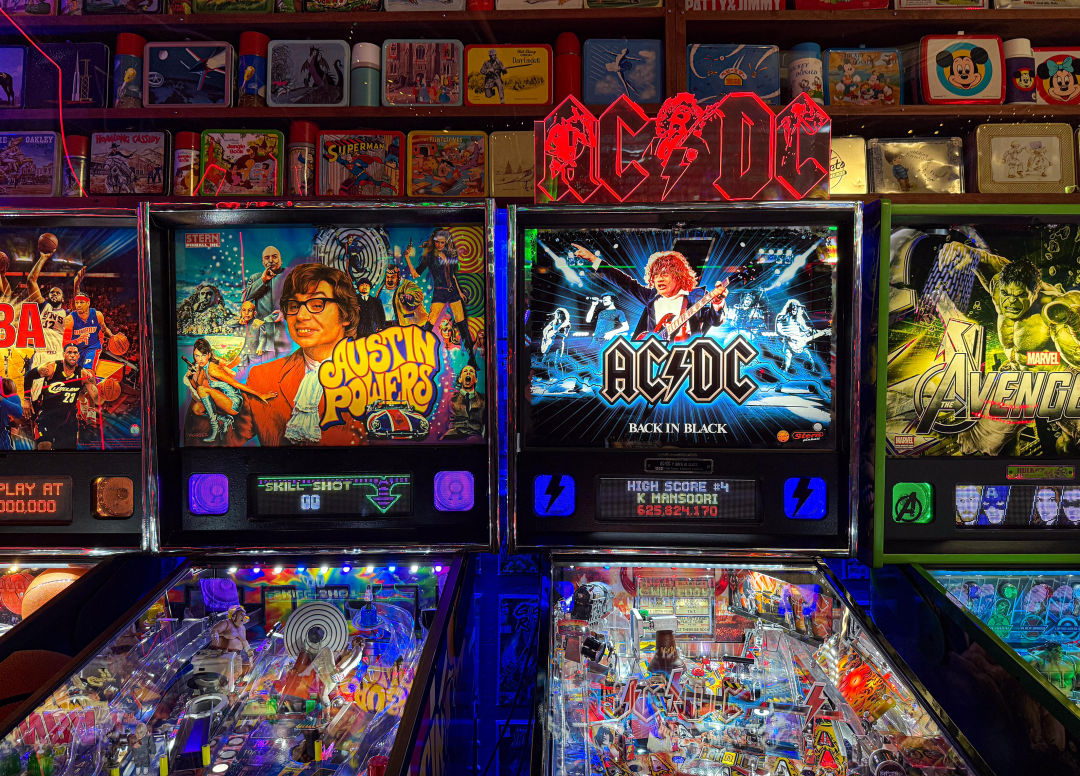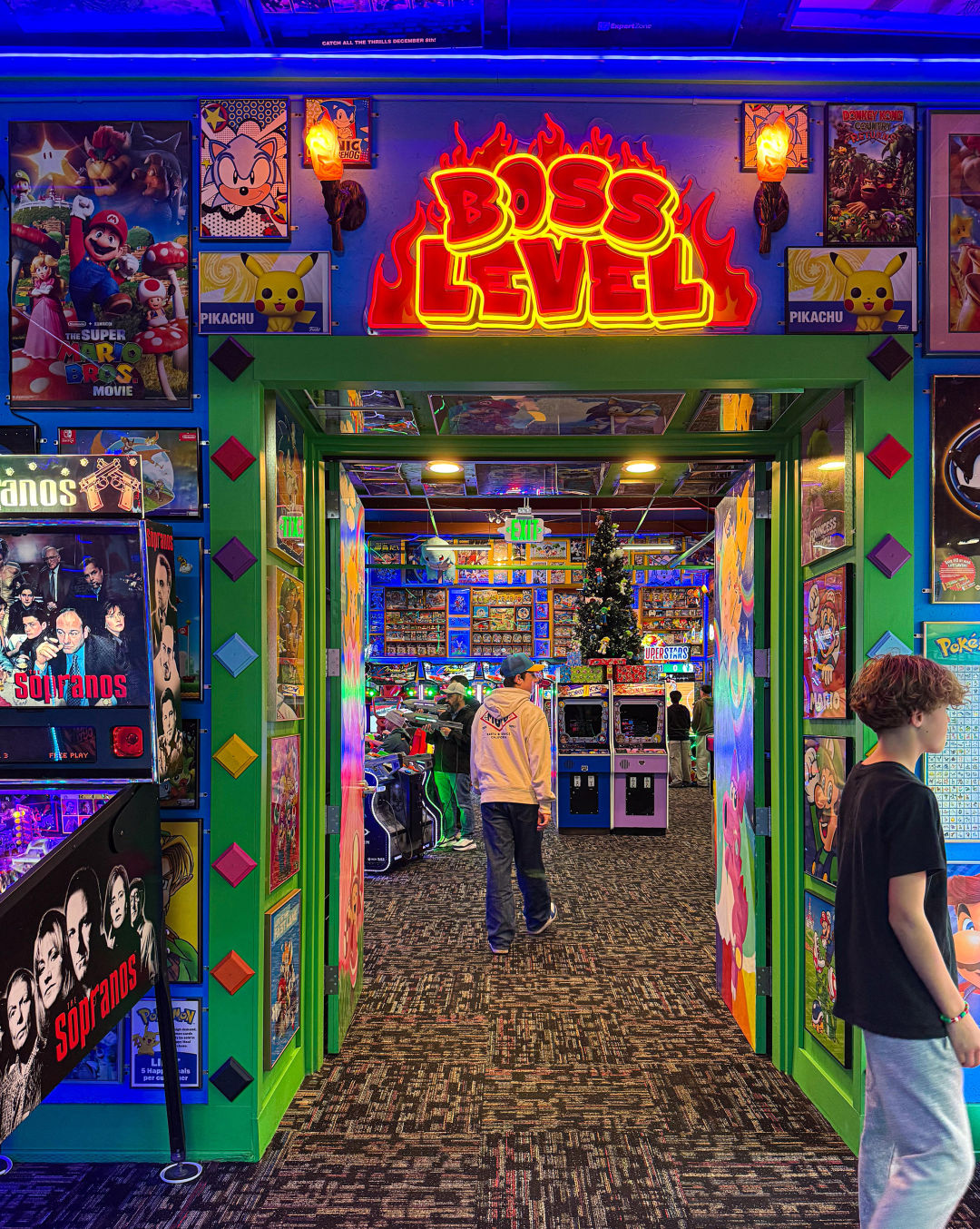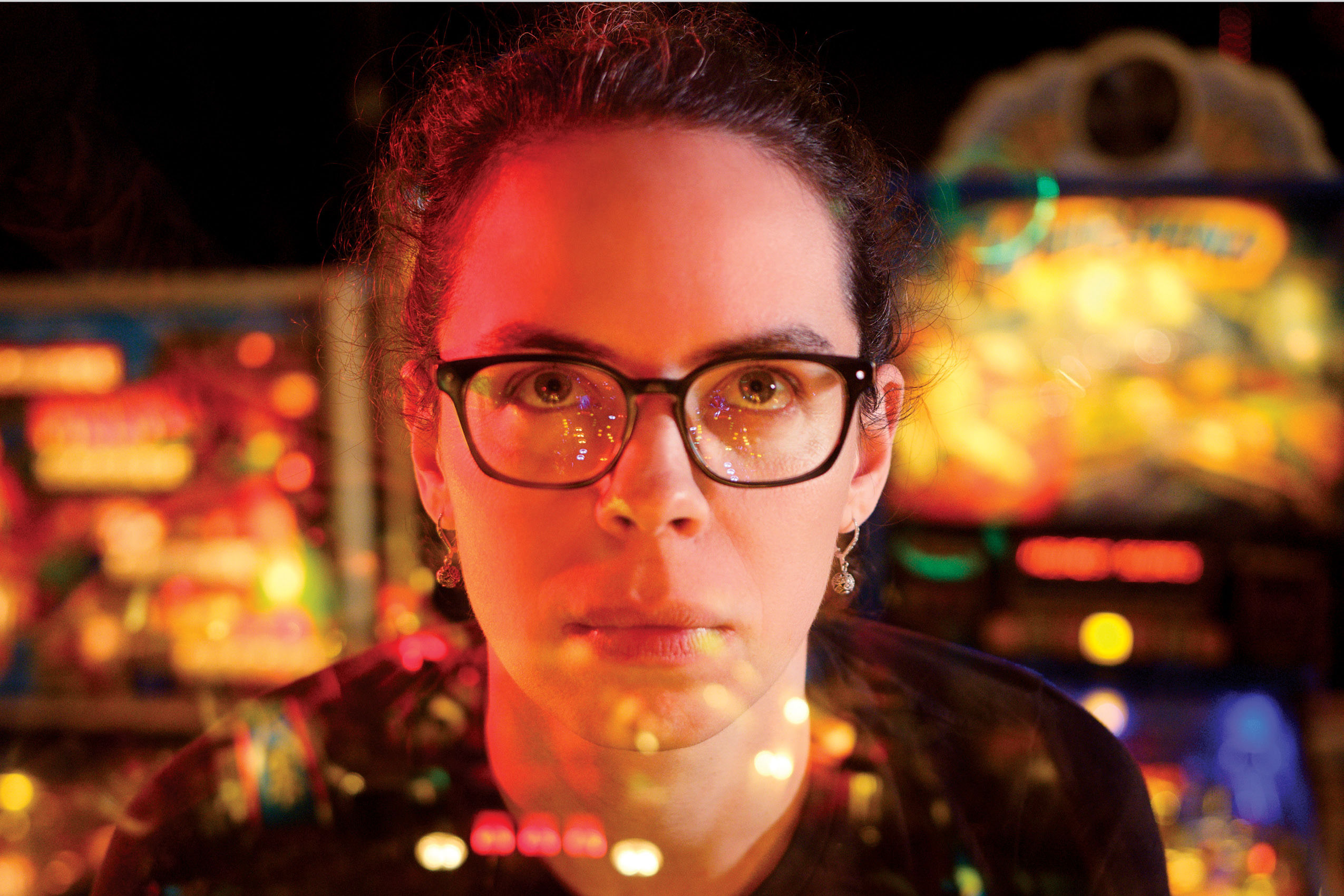Next Level Pinball Museum Is Oregon’s Finest Arcade

Image: Michael Novak
What’s the cost of a high trust society? The sort of place where you could lightly lose track of your kid for, say, 20 minutes, and not necessarily double over with a triumvirate of guilt, panic, and shame? At the Next Level Pinball Museum, the going rate is $23 per person. It might be the best money I ever spent.
Opened in 2017 off a lonely patch of land in deepest farmland Hillsboro (next to the paintball warehouse, amid tract work plots of regular farms and data farms), Next Level boasts more than 650 individual pinball machines and arcade games, the vast majority of which are set to free play with price of admission. At 27,000 square feet, it’s the largest arcade on the American West Coast, and one of the largest on the planet. Newsweek called it the “best arcade in America” this year. Somewhat improbably, and in keeping with Oregon’s long tradition of deeply quirky owner-operated small businesses, the pinball museum’s collection is sourced and curated by a single family, whose vast collection of games, vintage lunch boxes (owner Jordan Carlson’s father, Fred, has collected them over the last five decades), and pop culture ephemera make use of every last square inch of the space.
Many bars have pinball machines, and the wider culture around pinball in America is enjoying a modern resurgence: Recent reporting by The Economist shows a 15–20 percent year-over-year increase in new machine sales over the last decade. As with many cultural trends, Portland was into the game early; as of 2020, there were more pinball cabinets per capita here than any other city in the US. Ground Kontrol, the seminal Old Town combination bar-arcade, opened in 1999 (same year as Stumptown), helping pioneer the genre nationwide. Today, Portland is home to a panoply of choices on the arcade front. There’s Quarterworld, a massive converted theater on SE Hawthorne with around 100 games, as well as Wedgehead, which is a bar-first arcade with a couple dozen tables, plus local chains like Wunderland and Claw City.

Image: Michael Novak
I have been to all these places. I grew up playing arcade cabinets; happily I can still summon from the palace of memory certain crucial Street Fighter combinations, allowing me to best Ken, Chun-Li, and even the dreaded Blanka, before eventually falling to Guile in a best two out of three. By the time I was in my twenties, barroom pinball experienced something of a revival, and Ground Kontrol was a popular date-and-socializing spot when I first moved to Portland. The rest of them I’ve haunted over the last couple of years with my kid, navigating their various all-ages hours and operational quirks, accruing tickets and tokens and various detritus (presently strewn throughout my car), and doing my best to impart a very different form of screen time upon her spongy brain.
With all due respect, none of these places compare remotely to Next Level. It is the comparative effect of having faithfully visited one’s own humble house of worship every weekend of your life, and then, for the very first time, beholding the Sistine Chapel in its immense and timeless glory. Until you actually experience 27,000 square feet and 650 cabinets set to free play, it’s hard to properly describe. Words fail. Poets weep.

Image: Michael Novak
Oh, doth the ding-dings ring out upon entry, flippers echoing off cabinetry, the sonorous haptic clack of free game echoing in the round, a Rabelaisian bibendum of bings and bongs and level-ups. I’m here with my 8-year-old, and her friend (also 8), and within about 30 seconds two things become readily apparent to a parent: One, I have no hope in the slightest of tailing these two the entire time, so immediately fired up are they by the promise of bottomless free play in an endless technological bacchanal; and two, that’s probably fine. There is quite literally only so much trouble they could get into here. “Don’t break anything and don’t leave with anyone” are the only rules.
Off they dart in the direction of the Ninja Turtles cabinet, which allows me time for notes. The arcade is mobbed with people at 2pm on a weekend, with multiple birthday parties in the events room and every kind of adult and kid wandering around the space, one and all mutually gobsmacked by the surfeit of opportunity. Each pinball cabinet at Next Level is affixed with a unique info card, detailing the game’s designer, release date, and even who performed the soundtrack and audio cues. (Did you know Tina Fey and Scott Adsit from 30 Rock voiced much of Medieval Madness?) It’s an arcade nerd’s dream, sure, but there’s some approximate recounting of wider twentieth century cultural history happening live and in real time in this space—it’s not just an arcade, it’s not just a museum, it really is this kind of living historical exhibition of primary source material, like viewing great works in a collection and being given context by the curators. The history geek in me is deeply compelled.
There are old games and new games. Famous games and obscure games. This place has all my old favorites: Circus Voltaire, Diner, Champion Pub. The museum’s Addams Family table is noted as being “the most commercially successful pinball table of all time,” which tracks—you still see this one all the time in bars, arcades, and those combination bar-arcades—but I like that it sits alongside other comparative rarities like Johnny Mnemonic: Meet the Ultimate Hard Drive, or a table dedicated to the twisted sonic worldview of North Bay tweakrock heroes Primus.

Image: Michael Novak
The bar doesn’t serve alcohol, which lends to a family-friendly atmosphere. There’s a couple of food trucks outside (a hot dog cart, a pasta cart), and a strategically placed clutch of lounge chairs inside, facing a volume-off sports broadcast in case certain parental units need to take a load off (I briefly indulge). It’s hard to accurately describe how completely packed with crap this place is; I use the term lovingly, colloquially, because what it’s actually packed with is a world-beating collection of twentieth-century ephemera to stagger the mind. Hundreds of Furbys. Thousands of Happy Meal collectibles. Every single Goosebumps book ever released, from Night of the Living Mummy to My Hairiest Adventure, arranged in chronological order and preserved beneath plexiglass. A full-size, screen-ready posable model of Jar Jar Binks. Talking Pee-wee Herman dolls. A hundred framed back issues of Rolling Stone. Such an incredible amount of pop culture was created in the twentieth century, and I am boggled by its unceasing ability to sustain us here in the twenty-first.
Where the hell is my kid? Oh, there she is—she’s playing Tron pinball with her friend, next to a mom in her coolest true-vintage New Kids on the Block T-shirt, playing the Jurassic Park table alongside her teenage daughter, who wears, no joke, a Fiona Apple tour shirt (When the Pawn… ’99) and jeans so baggy and saggy that I wonder if they could be JNCO. I check in and my own kid waves me off—she’s fine. The arcade is well staffed; there’s people walking around wiping down tables, fixing stuff, keeping an eye on the place. None of my memories as a kid in video arcades involve my parents hovering over my shoulder, checking in every five minutes, making sure I was fine. My daughter and her friend have made friends with another roving band of kids, and now they’re headed to the Skee-Ball zone.

Image: Michael Novak
This broader anxiety I feel, letting my kid tear around the arcade with her friends, is a whole world to unpack. The disappearance of social norms around all-ages third spaces, the wider normalization of surveillance culture in the home as in public life (and politically), a wider sense of nostalgia (both good and bad) around the ’90s and Y2K as being some sort of imagined cultural zenith for American public life, the ways in which my own anxieties as a parent might be contributing to “the anxious generation.” Right now there are people reading this, judging me for briefly losing sight of my kid in a video arcade; America owns a long troubling legacy of child abductions around these kinds of spaces, and even if we’ve long since crested the wave on these kinds of crimes (perhaps a positive benefit of the aforementioned surveillance culture), the Pacific Northwest remains, now and forever, a kind of Murderland. At the very same time, there are people reading this who are performing great pronounced rotations of the ocular counter-roll, because only a wimp of a father would be this hung up on letting their kid run around an arcade for 20 minutes, particularly an arcade with a $23 door policy and tons of staff. Maybe I’m the problem; maybe our kids are anxious, because we’re anxious, because our Baby Boomer parents weren’t anxious enough.
I walk around and I think about this all, and I try not to think about it at the same time, which is helpfully easy, truth be told. If this place specializes in one thing, it is distraction. Look over there: Why is there an entire wall dedicated to Chuck Norris? Why were there so many Chuck Norris toys and lunch boxes and commando game sets made in the first place? What the hell even were the ’80s and ’90s, a cultural moment that I absolutely sous-vide’d my brain in as a child, but feels so impossibly foreign and far away today? I play a table themed around the awful 1995 film adaptation of Congo. I play cabinets dedicated to Shrek (the ogre), and Kiss (the band), and Waterworld (the infamous film flop). I jump on the Terminator 2 rat-a-tat cabinet, mowing down intelligent robots with a whinge of contemporary irony.
My kid comes running up with a fistful of tickets, and for a moment all is well in the world. The great green GloMold Slimer mounted high above the arcade floor watches over us all.




